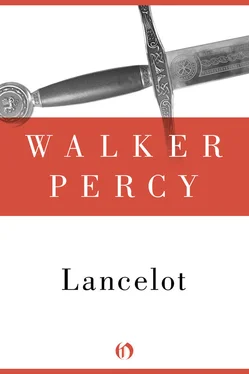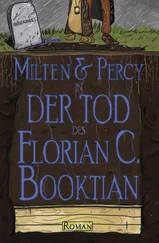Only then did I make my shopping list. Besides the usual hurricane items it contained:
1 18" Stillson wrench
4 10' sections Gerona plastic pipe, 3" diameter
4 3" sleeves
1 90° elbow
1 45° elbow
1 3" nipple (foot long)
1 3" to 1" reducer
1 lb. sealing PBC cmpd
1 roll duct tape
2 kerosene lamps
1 gal. kerosene
During the filming and before I went to the hardware store, I visited Tex and Siobhan. They were getting on each other’s nerves worse than ever. They both got on my nerves. Siobhan clung to me and beat me in the ribs with her fist. It was necessary to do something about Siobhan. It had been necessary for some time. The difference was that now it was possible to do something.
Siobhan loved music and took lessons on the old French spinet. Tex promised to buy her a new “pinana.”
“I’m going to buy you the biggest Steinway grand pinana in New Orleans. You gon play the new pinana for Tex?”
“No,” she said, not looking at Tex but clinging to my thigh with a fierce scissors grip of her thin legs and beating me fretfully. “Is he really going to buy me a piano?”
“Absotively, posalutely!” cried Tex.
Then I had a piece of luck. In his boring, repetitive way he began to come at me, jabbing me the way Siobhan beat me with her fist, jabbing with things he had said so often before he didn’t even listen himself.
“I’m telling you, boy, you better change that old black pipe under the house. That stuff rots like wood. I smelled a gas leak yesterday.”
“How could you smell it? There’s no captan in it. Methane has no smell.”
“I smelled it!”
He didn’t smell it. He wasn’t listening to himself. He didn’t even know he said he smelled it.
“I’m going to the hardware store now. Now listen to me, Tex. Here’s what I want you to do.”
For the first time he was startled to attention by my tone, as if somebody had jostled him and he had waked from a long boring dream. He was listening! I was going to tell him what to do. He knew this and knew he was going to do it.
“What?”
“For a long time you’ve wanted to take Siobhan to Odessa to visit your folks.”
“Sho,” he said, listening.
“I want her out of here tonight. This is a bad storm. Both of you get going now. I mean now. You can either drive to New Orleans and fly to Texas or drive all the way, but leave within the hour.”
It was the best I could do: Siobhan, I do believe the old bastard meant well, I only hope he didn’t drive you crazy or bore you to death.
“We’d rather drive, wouldn’t we, Siobhan? We’ll play count animals. I’ll count moocows and minnie cats and you count down hogs and twobit horses.”
“No fair!” said Siobhan, but she did let go of me and go to Tex. She liked the idea of a trip. “There are more cats and cows than hound dogs and quarter horses.”
They were going and that was that. Here is an incidental discovery: If you tell somebody what to do, they will do it. All you have to do is know what to do. Because nobody else knows.
The film company was shooting the last scene before the hurricane. The set was the front gallery of Belle Isle. It was the only remaining scene which could not be shot in Burbank. Following the scene, the crew planned to pack up their station wagons and go home.
It was not a long scene but it required many takes. In the scene the sharecropper, played by Elgin, and the sheriff, played by the actor who looked like Pat Hingle, come to Belle Isle accompanied by the Christlike hippy stranger, played by Dana, who has reconciled poor white sharecroppers, poor black sharecroppers, overseers, sheriffs, blacks, whites, and the half-caste girl, who was accepted by neither race. They have come to rescue the planter, played by Merlin, and his daughter the librarian, played by Margot, from the hurricane. The planter, however, fixed in his ancient prejudices and secretly liking the apocalyptic fury of the hurricane, decides to remain. He also expects his daughter to stay with him. The daughter decides to leave her father and go with the stranger. It is the farewell scene between father and daughter. After the farewell, the planter, who is not so much prejudiced as indifferent, caught up by aesthetic rather than social concerns, returns to the house alone, to his organ. Crashing chords of a Chopin polonaise fuse with the mounting fury of the hurricane.
“I want more of a Lear-like effect, Bob,” said Jacoby, turning off the hurricane machine after one of many takes. “You know, mad king raging on the heath, wild-eyed, hair blowing.”
“Yeah, right, Lear, okay,” said Merlin ironically, but Jacoby missed the irony.
Before the shooting began. I went to the bank and withdrew $75,000 from Margot’s and my checking account.
“What the hail, Lance?” said Macklin Maury Lamar, my cousin, who was president of the bank.
“We’re giving it to the American Negro College Fund.”
“Ah.”
I told him this for two reasons. One was that it was the only reason he would believe, believing as he did that I was still a liberal and therefore capable of any madness. (Yet curiously it was for him an understandable madness: you know how old Lance is, etc., etc.)
The other reason was that my explanation was, in a sense, true.
“Yeah,” said Macklin. “A wonderful cause. In fact I agree with you, that’s what they need.”
What was worrying Macklin was not this particular withdrawal but the likelihood of losing Margot’s and my half-million-dollar checking account. Or my asking him to pay interest.
“How do you want it, Lance?”
“In cash. Any denominations.”
“Why the cash, Lance?” asked Macklin, laughing heartily, eyes worried.
“I’m afraid your bank will blow down tonight. The money will be safer at Belle Isle.”
“There you go! Ha ha.” Macklin laughed and slapped his side, all the while keeping a sharp eye on me, trying to parse out craziness and horsiness, wondering whether I was ordinarily crazy as he always held me to be or possessed by some new craziness.
He gave me the $75,000 in hundreds in a locked canvas bag, handing me the little brass key separately.
After the shooting was finished at Belle Isle and the crew was busy dismantling the hurricane machine and packing their station wagons, I summoned Elgin to the pigeonnier and gave him the $75,000. He unlocked the bag with the little brass key. He looked at the money.
“How much money is this?”
“Seventy-five thousand dollars.”
“What’s it for?”
“It’s very simple. I have a great deal of money, more than I can use, and there are two things you want.”
“Yes?”
“One is to finish your education at M.I.T. despite the fact that your scholarship has run out.”
“Yes.”
“The other is you want to marry your classmate Ethel Shapiro and buy a house in Woodale, a subdivision of Concord, which though a cradle of American liberty is unwilling to sell houses to blacks or Jews especially blacks married to Jews. Yet you are determined to buy a house there despite all obstacles.”
“Not despite. Because.” Elgin looked down at the money. “Okay. But you don’t owe me anything. I’d have done it for you anyway. It was an interesting problem. Sorry about the tape quality. The color was defective.”
“I liked it that way.”
“The sound was rotten, too. Jesus, I felt bad about that.”
“Don’t worry about it. It was okay.”
“Well—” said Elgin, standing in the doorway. He was always standing in the doorway.
“Yes?”
“I have a feeling there is something else. Perhaps a condition.”
“A condition?”
“Something you want me to do.”
Читать дальше












